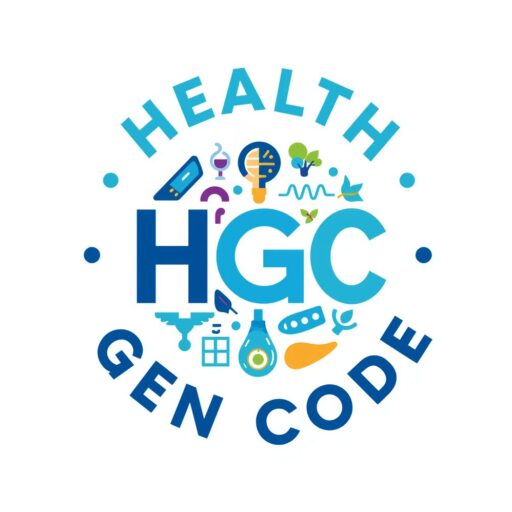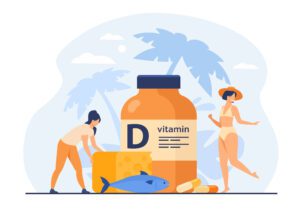When most of us hear “vitamin,” we think of something small and optional—like a capsule in a bottle. But Vitamin D is much more than that. It’s often called the “sunshine vitamin”, but its role goes far beyond sunlight. From strong bones to immune protection, Vitamin D is one of the most vital nutrients in your body.
And here’s the truth: a lot of people today have low vitamin D levels without even realizing it. Busy lifestyles, indoor work, pollution, and limited sun exposure all add up, leaving us deficient in a nutrient that is essential for good health.
That’s why doctors often recommend a vitamin D supplement—to bridge the gap that food and sunlight alone can’t always cover. But before jumping to pills or drops, it’s worth understanding what Vitamin D really does, how it works in your body, and what Vitamin D foods can naturally boost your levels.
Table of Contents
ToggleIntroduction: Vitamin D Foods and the Bigger Health Picture
At its core, Vitamin D is more like a hormone than a vitamin. Your skin can produce it naturally when exposed to sunlight. Yet, many people today rely heavily on vitamin D foods and supplements because daily sun exposure is no longer a guarantee.
The modern health challenge is simple: while our parents and grandparents may have had healthier Vitamin D levels due to outdoor lifestyles, today’s generation is struggling with vitamin D deficiency on a global scale. This deficiency isn’t just about weak bones—it affects energy, mood, immunity, and long-term wellbeing.
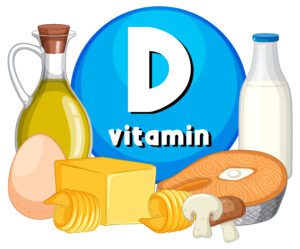
In this blog, we’ll explore:
-
Why doctors prescribe vitamin D supplements
-
How Vitamin D functions in the body
-
Which vitamin D foods make a difference
-
The signs of low vitamin D you should know
-
Practical ways to protect yourself with smart nutrition
What Is Vitamin D, Really?
A Vitamin That Acts Like a Hormone
Unlike most vitamins, Vitamin D isn’t just obtained from diet—it’s produced inside your body when your skin interacts with sunlight. It then gets converted in the liver and kidneys into its active form, helping regulate calcium, bone growth, and immune response.
Why It Matters
Without enough Vitamin D, calcium cannot be absorbed effectively, no matter how much milk or leafy greens you consume. That’s why doctors emphasize both vitamin D benefits and calcium intake together.
Why Doctors Prescribe Vitamin D Supplements
1. Fighting Widespread Deficiency
Studies show that vitamin D deficiency is one of the most common nutritional gaps worldwide. Sedentary lifestyles, sunscreen use, and limited outdoor time have left even sunny countries with surprisingly high rates of low vitamin D.
2. Supporting Bone and Muscle Health
Doctors often prescribe a vitamin D supplement for patients with weak bones, fractures, or osteoporosis. Without Vitamin D, calcium and phosphorus cannot do their job in keeping bones and muscles strong.
3. Boosting Immunity
Vitamin D also supports immune defense. People with low vitamin D levels are often more prone to infections, fatigue, and even slower recovery.
4. Bridging the Nutrition Gap
Sometimes diet alone cannot provide enough vitamin D foods—especially for vegetarians or people with dietary restrictions. Supplements then become a practical solution.
Vitamin D Foods: Natural Sources That Count
If you want to boost your Vitamin D naturally, the right foods can help. While not as powerful as direct sunlight or supplements, these options still make a difference when included consistently.
1. Fatty Fish
Salmon, mackerel, sardines, and tuna are among the richest vitamin D foods. Just one serving can provide a large portion of your daily needs.
2. Egg Yolks
Eggs are not only a protein source—they also provide small but steady amounts of Vitamin D.
3. Fortified Milk and Dairy
Many brands fortify milk, yogurt, and cheese with Vitamin D, making them easy everyday sources.
4. Mushrooms
Certain mushrooms naturally contain Vitamin D, especially when exposed to sunlight during growth.
5. Fortified Plant-Based Milk
For vegans, almond milk, soy milk, or oat milk fortified with Vitamin D can be reliable alternatives.
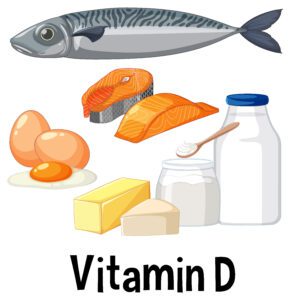
Vitamin D Benefits Beyond Bones
1. Energy and Mood
People with low vitamin D often complain of fatigue and low mood. Research shows Vitamin D helps regulate neurotransmitters linked to happiness and energy.
2. Stronger Immunity
Vitamin D influences white blood cells, helping your body fight infections more effectively.
3. Reduced Risk of Chronic Illness
Adequate Vitamin D levels may lower the risk of diabetes, cardiovascular issues, and certain autoimmune conditions.
4. Muscle Strength
Vitamin D doesn’t just strengthen bones—it also plays a role in preventing muscle weakness, especially in older adults
The Warning Signs of Low Vitamin D
Signs of Low Vitamin D
One of the most concerning things about low vitamin D is how quietly it creeps in. Many people don’t realize they are deficient until symptoms become noticeable.
1. Constant Fatigue
If you feel drained no matter how much you rest, vitamin D deficiency may be affecting your energy metabolism.
2. Frequent Illness
Vitamin D supports immune defense. Low levels can make you catch colds and infections more often.
3. Muscle and Bone Pain
Aching bones, sore back, or muscle weakness may be linked to inadequate Vitamin D. This happens because your body struggles to use calcium effectively without it.
4. Mood Changes
Low Vitamin D has been connected to mild depression, mood swings, and seasonal affective disorder (SAD).
5. Hair Loss and Slow Healing
Research suggests low vitamin D may be linked with hair thinning and delayed wound healing.
What To Do If You Notice These Signs
If you notice two or more of these symptoms consistently, it’s worth discussing with your doctor. A simple blood test can confirm your Vitamin D status, and treatment may include adjusting your diet, spending time outdoors, or starting a vitamin D supplement.
Vitamin D Supplement: When Food Isn’t Enough
Even if you eat the right vitamin D foods and spend some time in the sun, you might still need extra support. This is where a vitamin D supplement comes in.
Forms of Supplements
-
Tablets and Softgels: Easy to take daily.
-
Drops and Liquids: Useful for children or those who dislike pills.
-
Powders or Sprays: Convenient for quick absorption.
Most supplements come in two forms: Vitamin D2 (plant-based) and Vitamin D3 (animal-based). D3 is often preferred because it raises Vitamin D levels more effectively.
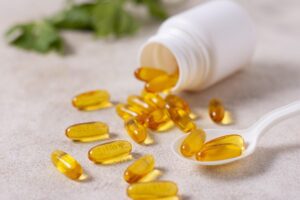
When Doctors Prescribe Them
Doctors often prescribe supplements if:
-
A blood test confirms low vitamin D
-
You have recurring bone pain or fractures
-
You experience fatigue and weakness linked to deficiency
-
You live in a low-sunlight region
Dosage and Safety
While Vitamin D is essential, too much can lead to toxicity. This is why self-dosing high amounts isn’t safe. Doctors personalize dosage based on blood test results, age, and health conditions.
Pairing With Other Nutrients
Supplements work best when combined with calcium, magnesium, and even Vitamin K2. Together, these nutrients help strengthen bones and improve absorption.
Lifestyle Factors That Affect Vitamin D Levels
Your Vitamin D status is shaped by much more than diet. Even if you eat all the right vitamin D foods, certain lifestyle and environmental factors can still lower your levels.
1. Age and Natural Production
As we grow older, our skin becomes less efficient at producing Vitamin D from sunlight. This makes older adults more prone to vitamin D deficiency, even when living in sunny regions. That’s one reason doctors often suggest a vitamin D supplement for seniors.
2. Skin Tone
Melanin, the natural pigment that gives skin its color, also affects Vitamin D production. Darker skin tones naturally block more UV rays, which means they need longer sun exposure compared to lighter skin tones to make the same amount of Vitamin D.
3. Geographic Location and Climate
Living in areas with long winters, high pollution, or limited sunshine can reduce your natural Vitamin D production. People in northern latitudes often experience low vitamin D during colder months and may rely more heavily on fortified foods or supplements.
4. Lifestyle Choices
Indoor lifestyles, working at desks all day, or consistently applying strong sunscreen reduce sun exposure. While sunscreen protects against skin damage, it also limits Vitamin D production.
5. Diet Patterns
People who avoid animal products or dairy may not consume enough vitamin D foods, since most natural sources come from fish, eggs, or fortified dairy. Vegans often need fortified plant-based milk or supplements.
Balancing Food, Sun, and Supplements
The best way to maintain healthy Vitamin D levels is through a balanced approach — using sunlight, diet, and supplementation when necessary.
1. Smart Sun Exposure
Short, regular sun exposure is usually enough. Spending 15–20 minutes in the sun, two to three times a week, with your face and arms exposed, can boost Vitamin D naturally. Be mindful not to overdo it, as excess UV exposure raises skin cancer risk.

2. Choosing Vitamin D Foods
Include rich sources of Vitamin D in your weekly meals:
-
Fatty fish like salmon or mackerel
-
Egg yolks for a daily boost
-
Fortified milk, yogurt, or cereals
-
Mushrooms exposed to sunlight
These foods don’t just support Vitamin D—they also contribute to protein, minerals, and other nutrients essential for energy.
3. Knowing When Supplements Help
For people with restricted diets, health conditions, or limited sunlight, vitamin D supplements provide reliable support. Doctors may recommend daily low-dose tablets or higher prescription doses for severe deficiency.
By combining food, sunlight, and supplementation, you create a safety net for long-term health without over-reliance on one single source.
Practical Nutrition Guide: Adding Vitamin D Foods Every Day
-
Breakfast: Add a boiled egg or fortified cereal with milk.
-
Lunch: Include grilled salmon or fortified plant-based milk in a smoothie.
-
Dinner: Try mushroom stir-fry or sardines with vegetables.
-
Snacks: Yogurt fortified with Vitamin D can be a simple boost.
Consistency is the key. Small but regular steps help prevent vitamin D deficiency long-term.
Final Thoughts: Building a Vitamin D Lifestyle
Vitamin D is not just a nutrient—it’s a foundation of long-term health. Whether you get it from sunlight, vitamin D foods, or a vitamin D supplement, what matters most is maintaining a balance that keeps your bones, muscles, immunity, and energy strong.
A healthy generation depends on smart choices today. And Vitamin D is one of those choices that can transform wellbeing across every stage of life.
Call-to-Action
Want more clean eating, natural fitness tips, and real wellness guidance that actually makes sense?
Explore the Medicine or Food section of Healthy Gen Code (HGC) — where we simplify health, cut through trends, and focus on what works for your body.
We’re building a healthier generation, one smart choice at a time.
Contact us here and support the journey with your presence, ideas, or even a kind word.
Let’s grow healthier together — across every generation.
Vitamin D Foods and Supplements – Frequently Asked Questions
1. What are the best natural vitamin D foods?
Fatty fish like salmon, mackerel, and sardines top the list. Egg yolks, beef liver, and mushrooms also provide Vitamin D. Many everyday items like milk, yogurt, or breakfast cereals are fortified, making it easier to include vitamin D foods in your diet.
2. Can I get enough Vitamin D from food alone?
For many people, food alone isn’t enough, especially in winter. While vitamin D foods help, most people need a mix of sunlight exposure and possibly a vitamin D supplement to maintain healthy levels.
3. What causes vitamin D deficiency?
The main reasons include limited sun exposure, darker skin tone, age, or avoiding vitamin D foods. Certain health conditions and medications may also interfere with absorption, leading to low vitamin D.
4. What are the symptoms of low vitamin D?
Symptoms may include fatigue, frequent illness, bone or muscle pain, mood changes, and slower wound healing. Over time, vitamin D deficiency can weaken bones and affect immunity.
5. How much Vitamin D do I need daily?
Most adults need about 600–800 IU daily, though individual needs vary. Some may require more based on lifestyle, diet, or medical advice. Your doctor may recommend a vitamin D supplement if blood levels are low.
6. What is the difference between Vitamin D2 and D3 supplements?
Vitamin D2 is plant-based (from mushrooms and yeast), while D3 is animal-based (from lanolin or fish oil). Both raise Vitamin D levels, but D3 is often considered more effective, making it a common choice for a vitamin D supplement.
7. Can Vitamin D improve mood?
Yes, one of the surprising vitamin D benefits is its link to mood regulation. Low levels are associated with seasonal depression, fatigue, and irritability. Getting enough from vitamin D foods, sunlight, or supplements may support emotional wellbeing.
8. Do vegetarians and vegans need Vitamin D supplements?
Yes, plant-based diets often lack natural vitamin D foods. Fortified non-dairy milk, cereals, or mushrooms help, but many vegans and vegetarians still benefit from a vitamin D supplement.
9. Does Vitamin D help with immunity?
Absolutely. One of the key vitamin D benefits is its role in supporting immune cells. People with low vitamin D may be more prone to colds, flu, and other infections.
10. What happens if I take too much Vitamin D?
Excess supplementation can cause toxicity, leading to nausea, kidney strain, and calcium buildup in the body. It’s always safest to use vitamin D supplements under medical guidance and not exceed prescribed doses.
11. Can Vitamin D help with bone health?
Yes, Vitamin D helps your body absorb calcium and phosphorus, making it essential for strong bones and teeth. Without it, bones may become weak, brittle, or at risk for fractures — one of the most well-known vitamin D benefits.
12. Do children need Vitamin D supplements?
Yes, children need Vitamin D for bone development and growth. Babies who are breastfed may need drops, since breast milk alone often doesn’t provide enough. Pediatricians often recommend age-appropriate vitamin D supplements for growing kids.
13. Which mushrooms contain Vitamin D?
Mushrooms exposed to UV light naturally produce Vitamin D. Varieties like maitake, portobello, and shiitake can be good vitamin D foods, especially for vegetarians.
14. Does cooking affect Vitamin D in foods?
Cooking can slightly reduce Vitamin D content, especially with high heat. However, most vitamin D foods like fish and eggs still retain much of their Vitamin D after cooking.
15. Can Vitamin D help with weight management?
Research suggests low Vitamin D may be linked to weight gain and difficulty losing fat. While not a magic solution, maintaining healthy levels with vitamin D foods and supplements may support metabolism.
16. Is Vitamin D linked to hair health?
Yes, studies show that low vitamin D may contribute to hair thinning or loss. Ensuring you get enough Vitamin D may support healthy hair growth, though genetics and other nutrients also play roles.
17. Do I need Vitamin D year-round?
Yes. In summer, sunlight often provides enough, but in winter or cloudy regions, vitamin D deficiency is common. Balancing vitamin D foods and supplements ensures consistent levels throughout the year.
18. Can Vitamin D reduce inflammation?
Vitamin D supports immune balance, which may reduce chronic inflammation. This is one of the lesser-known vitamin D benefits linked to overall wellbeing and reduced risk of long-term illness.
19. Should I take Vitamin D with food?
Yes. Vitamin D is fat-soluble, meaning it absorbs better when taken with healthy fats like avocado, olive oil, or nuts. Pairing a vitamin D supplement with a meal increases its effectiveness.
20. How do I know if I need a Vitamin D supplement?
The best way is through a blood test. If results show low vitamin D, your doctor may suggest increasing vitamin D foods, sunlight, or starting supplements. Never guess your dosage without testing.
Sources
- https://www.nhs.uk/conditions/vitamins-and-minerals/vitamin-d/
- https://www.healthline.com/nutrition/9-foods-high-in-vitamin-d
- https://nutritionsource.hsph.harvard.edu/vitamin-d/
- https://ods.od.nih.gov/factsheets/VitaminD-HealthProfessional/
Referral
- Get off using https://hostinger.in?REFERRALCODE=HGC
- Get off using the link here for buying Premium Web Hosting at Hostingrer https://cart.hostinger.com/pay/de220648-48ab-4d33-9c23-477a6764af14
- Get off using the link here for buying Cloud Startup at Hostingrer https://cart.hostinger.com/pay/fecdf014-ea49-431b-913a-88f30fe1db42
